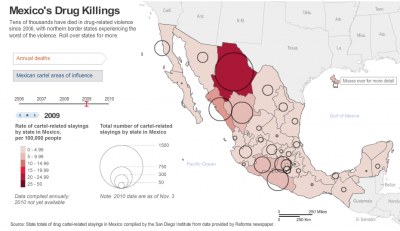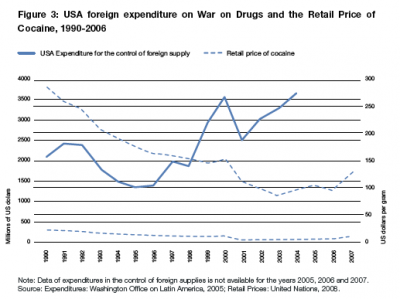
I was talking to a colleague of mine who has travelled quite a bit to México since he was a kid. His take on the increasing violence of the border towns tend to just affect those involved in criminal activities or tourists doing things they have no business doing.
Lately, the violence of the cartels has been resembling scenes from Breaking Bad. One of the things going on in Nuevo Laredo, the terminus of I-35 and a key port of entry between the US and México is a feud between rivalling factions that were once allies, the Zetas and the Gulf Cartel. President Felipe Calderón and the Mexican army has been deployed. The WSJ reports corruption and a state of anarchy in northern México, while gunfire from street battles reaches US soil over in El Paso and a collapse of tourism in many border towns further erodes the economy amidst a lingering recession. {While there is increased violence, the reality for tourists is that 70 Americans have been killed as “innocent bystanders“ since 2004. Nevertheless,the US State Department has issues a travel warning and has pulled consulate employees.}
 While Hilary and Barack might disagree on whether México resembles Colombia of years past, the White House is increasingly concerned about the violence and is likely to be spending more on combatting it.
While Hilary and Barack might disagree on whether México resembles Colombia of years past, the White House is increasingly concerned about the violence and is likely to be spending more on combatting it.
This isn’t a clear cut case of good guys and bad guys, making US policy dicey to say the least. It’s one thing to talk about a war on drug trafficking and addressing issues of corruption, but there’s no scorecard and no clear cut way to know who can be trusted and citizens are better off keeping their mouths shut. Last year, The Atlantic’s article, “The Fall of Mexico”, made this clear with how civil rights are going out the window with Calderón’s militarization::
“Meanwhile, human-rights groups have accused the military of unleashing a reign of terror—carrying out forced disappearances, illegal detentions, acts of torture, and assassinations—not only to fight organized crime but also to suppress dissidents and other political troublemakers. What began as a war on drug trafficking has evolved into a low-intensity civil war with more than two sides and no white hats, only shades of black. The ordinary Mexican citizen—never sure who is on what side, or who is fighting whom and for what reason—retreats into a private world where he becomes willfully blind, deaf, and above all, dumb.”
Quibbling over comparing México to Colombia 20 years ago fails has implications for US policy in that it determines how much US drug policy is contributing to the strength of the cartels and the violence over turf. Three ex-Presidents, of Brasil, Colombia, and México, wrote a report titled “Drugs and Democracy: Towards a Paradigm Shift” [pdf-English], emphasizing a public health approach to dealing with the problem and curbs demand. I feel this excerpt is worth quoting::
“The European Union policy focusing on the reduction of the damages caused by drugs as a matter of public health, through the provision of treatment to drug users, has proved more humane and efficient. However, by not giving appropriate emphasis to the reduction of domestic consumption in the belief that the focus on harm reduction minimizes the social dimension of the problem, the policy of the European Union fails to curb the demand for illicit drugs that stimulates its production and exportation from other parts of the world.
The long-term solution for the drug problem is to reduce drastically the demand for drugs in the main consumer countries. The question is not to find guilty countries and allocate blame for this or that action or inaction, but to reiterate that the United States and the European Union share responsibility for the problems faced by our countries, insofar as their domestic markets are the main consumers of the drugs produced in Latin America.”
A prohibition/criminal approach to drug enforcement hasn’t been effective. The report cites statistics::

The report cites that increased expenditures on the “War on Drugs” hasn’t affected demand or price. On the other hand, depenalization of consumption {which isn’t the same as decriminalization, but a move towards a more humane approach to drug enforcement and addiction} in both North America and the EU hasn’t resulted in increased demand.
The problem being is that the current state of drug enforcement has created a highly lucrative black market for drugs by organized crime cartels, much akin to the US experience with the prohibition of alcohol.
I don’t get a sense that the Obama administration and the Attorney General’s office are really open to moving towards a public health/depenalization approach to the drug trade. AG Eric Holder stated he was strongly against California’s Prop. 19, which would have permitted distribution of marijuana subject to local regulation and taxes. His concerns? That it would impede going after traffickers of pot and harder drugs like cocaine. Paradigm shifts are tough, but one would hope that there would a more holistic approach to dealing with the drug problem and how its market is fostering crime, corruption, and violence.
Twitterversion:: [blog] Violence & the drug wars in northern México. US policy implications for @whitehouse, Obama, Clinton, & Holder @ThickCulture @Prof_K

Comments 1
Amani — January 2, 2022
Stunning story there. What happened after? Thanks!|